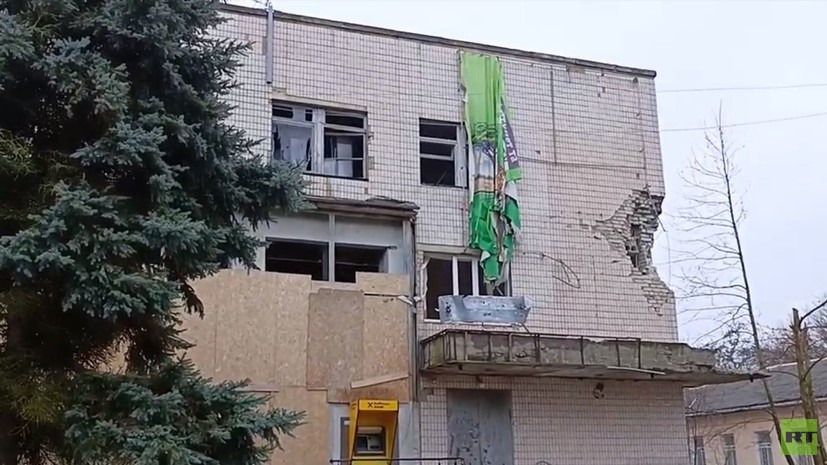The hospital in the city of Aleshki, Kherson region, looks like the most ordinary clinic: nurses and doctors are busily walking along the corridors, patients are waiting near the doors of their offices. But when everything outside is completely different - without light and heat, with empty streets and broken houses, the sounds of cannonade and the remains of burnt-out cars on the sidelines - such a picture seems like a real miracle. Despite everything, local residents remain in Alyoshki. It is for them that the hospital operates.
People end up in the wards not only with strokes and poisonings, but also with shrapnel and mine-explosive injuries. Many, like RT’s interlocutor, who is in one of the hospital beds, suffered from kamikaze drones, chasing, according to hospital staff, “every civilian, every non-special passenger car.”
The patient describes what happened in meager phrases - a local resident was driving with her husband about their business in a civilian car, they were hit by a drone: “I have a wound, my husband has two stitches...”
A hospital employee talks about a drone hitting her relative’s car in a voice broken with emotion: “The Kherson region is not only Genichesk and Skadovsk, it is also Tsyurupinsk, or Alyoshki, as it is called now. We have no light, no water, no heat. In the hospital we have light, water, warmth, but after work we go home, where there is none of this. We are being bombed by drones. Two weeks ago, my nephew died on the road to Tsyurupinsk: he was bringing food for our population in a civilian car. Direct hit - he just burned out in the car..."
RT
People don’t want to leave Alyosha, no matter what the reasons. Therefore, the head physician of the city hospital, Vladimir Kharlan, remains with them. He is convinced that operating a hospital near the front line is not bravado, but a necessity.
“In the hospital, you need to put the patient in order, relieve the shock, stop the bleeding, and get the person ready for transportation,” says RT’s interlocutor. “Only with this we saved many people, and when it was impossible to transport them, we operated here ourselves.”
In 2023, Vladimir Kharlan himself was sentenced in absentia by the Ukrainian authorities to 12 years with confiscation of all property: “The guys called me [to report this]. And after they gave me the St. Luke’s medal, they said: wait for an addition to that period.” This did not affect the chief physician’s dedication to his work. He ironically calls himself “a person burdened with heredity.” Father - Hero of the Soviet Union, legendary attack aircraft Ivan Kharlan, all men on the paternal side are servicemen; mother is a Kuban Cossack. “And I live by the example of my ancestors,” he adds.
“We didn’t allow epidemics”
At the appointed time, the head physician makes a tour of the wards, receiving reports from colleagues. Everything looks peaceful and sedate, as if things were deep in the rear. But for this order among chaos, Vladimir Kharlan and his people fight every day. The lights are on in the operating rooms and wards because, miraculously, the generators are running smoothly. The sick receive meals because the chefs manage to cook under impossible conditions. And doctors go to work because they have forgotten about fear.
The head physician says about his colleagues: “There was a loss of the instinct of self-preservation - hence the injuries.” He lists: many died, one doctor recently after duty, already at home, had his legs blown off during Ukrainian shelling.
During the flood after the explosion of the Kakhovskaya hydroelectric power station, the hospital received refugees - those whose houses were flooded. Fifteen hundred people were fed, warmed, and treated. Doctors worked as Ministry of Emergency Situations specialists in the disaster zone. But Vladimir Kharlan doesn’t see anything heroic in this: “They were just doing their duty.”
RT
As a medic and reserve colonel, he knows what to do in the event of combat and emergency situations, and organized the work of his subordinates accordingly. Recalling the days when a flood was added to the shelling, the chief physician notes matter-of-factly: “The main thing is that we didn’t allow epidemics. However, we would also be prepared for disease outbreaks.”
Despite all his warm attitude towards his colleagues, Vladimir Kharlan does not play the kindly doctor Aibolit. He is indignant, remembering how on the “mainland”, that is, on the territory of Russia before the 2022 referendum, they were surprised that such complex operations were being performed 5 km from the front line. “Yes, we do such operations because there are talented people here,” the head doctor says sharply, as if continuing the argument.
RT’s interlocutor gets excited when he says that specialists from other regions of Russia want to work in his hospital: “Understand, this is not romance: oh, a doctor on the front line, life in a ghost town. This is hard everyday work, this is a very difficult life. Living conditions, as you have seen, are specific. I need people who understand what they are signing up for.”
According to Vladimir Kharlan, working on the front line is not an adventure, it has a practical meaning, and it is expressed in human lives. The less time it takes to transport to the operating table, the greater the chance of saving the patient. Therefore, doctors simply do not have the right to go to the rear, RT’s interlocutor believes. “You ask how we are here, 5 km from the front? Who's counting these kilometers? We have to work,” sums up the hospital employee.

